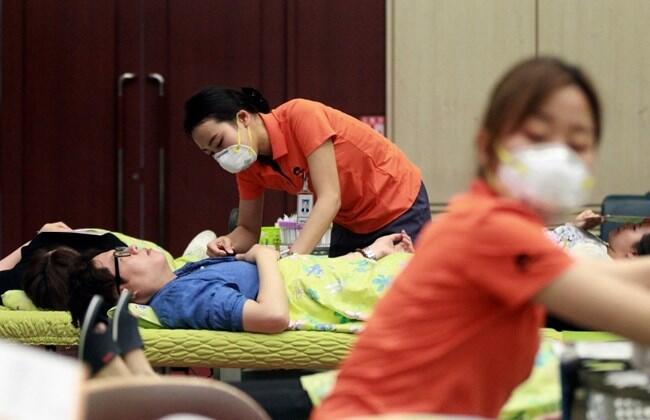Three more cases of the virus were also confirmed Thursday, despite authorities saying earlier in the week that South Korea had weathered the worst of the crisis. The number of infections now stands at 165, in what is the largest outbreak of Middle East Respiratory Syndrome outside Saudi Arabia. The World Health Organization (WHO) said Wednesday the South Korean outbreak was a “wake-up call” and that a lack of awareness about the virus among health workers and the public was a major contributing factor to its rapid spread. MERS patients had been kept in crowded emergency rooms for long periods, it said, and the practice of “doctor shopping” – visiting multiple hospitals for second and third opinions – was also a contributing factor. The custom of many visitors and family members staying with infected patients in their hospital rooms also facilitated the spread of the virus, the WHO’s emergency committee meeting in Genevafound. Experts within South Korea have also criticised President Park Geun-Hye’s government for its response to the outbreak. “There are doubts whether the quarantine and monitoring are being carried out thoroughly for the thousands of people who have been placed in isolation,” Kang Cheong-Hee, Vice President of theKorean Medical Association told AFP. “The authorities must take tougher measures to make sure that both confirmed patients and suspected virus carriers must not mingle with other ordinary people,” he said. The number of new infections in South Korea had fallen steadily until Tuesday, when the Health Ministry said it was cautiously optimistic the worst was over, but eight new cases reported Wednesday dashed those hopes. Health authorities said they were braced for more cases to occur sporadically and possibly in groups in other hospitals than theSamsung Medical Center in Seoul, which is considered the epicenter of the outbreak with about half of confirmed cases originating there. The ministry Wednesday dispatched a 17-member team of experts to the Samsung Medical Center, which has come under criticism for substandard controls. Officials said Thursday that 35 percent of the total cases involved families and friends who had visited patients or given them nursing care, while another 18 percent were medics. More than 6,700 people are currently being held in quarantine in a bid to halt the spread of the virus, up three percent from Wednesday. Around 4,500 others have already been released from isolation. But alarming reports of infected people slipping through quarantine measures have undermined government efforts to assuage public fear over a virus that has already begun hurting the country’s sagging economy. A 41-year-old male belatedly told authorities that he developed symptoms several days earlier than he had initially reported, prompting health workers to urgently put dozens of people he had come into contact with on the resort island of Jeju under quarantine. The man refused to stay in hospital for a test and threw a tantrum, vowing to “spread the virus everywhere” and breaking a hospital door lock. He then took a taxi and returned home, before being forcibly put in isolation. The last confirmed case involved a 79-year-old man who had been receiving dialysis at a hospital in Seoul even after he developed MERS symptoms nine days ago. The 111 other patients who received dialysis treatment in the same hospital room will now have to be put under quarantine, the ministry said. Agence France Presse











